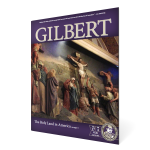Platitudes Undone
It would be easy and even agreeable to turn over the pages of the book and say, in reply to each sentence, the sentence it provokes in idle repartee. It is a real value in the book that there are so many obvious answers to everything. (Daily News, June 29, 1912)
I have seen a few of the books the Chesterton owned. Most of them are quite mutilated, covered with sketches right over the text, pages singed by cigar burns, and bindings that belie abuse. And that is what makes them so valuable. Strangely, most of the drawings seem to have nothing to do with the text. Once in a while a word appears or a written phrase that may or may not be connected. One would expect Chesterton to have a dialogue with the author, but that is usually not the case. The one notable exception is his copy of Holbrook Jackson’s Platitudes in the Making, published in 1911. He responds to each and every one of Jackson’s “platitudes,” and in the process writes almost as much as the author, so much so that the result was published as a book of its own—sixty years after Chesterton’s death.
The book had been presented to Chesterton as a gift from Jackson, who, like George Bernard Shaw and H.G. Wells, was one of Chesterton’s philosophical opponents with whom he remained on friendly terms. After his death, the book was part of Chesterton’s personal library that was unceremoniously disbursed. San Francisco Bookseller David Magee, who once lived in Beaconsfield and knew Chesterton, sold the book in 1955 to Dr. Alfred Kessler, who quietly kept it for over thirty years, until in 1988, he revealed it to the world. Even the New York Times trumpeted an article about the “new” Chesterton manuscript. In 1997 Ignatius Press published an exact facsimile of the book, with Chesterton’s distinctive hand-written comments in green pencil, under the title Platitudes Undone. Call it Chesterton’s 106th book, or thereabouts.
Holbrook Jackson is almost a parody of modernism. He is an agnostic, a socialist, a relativist. He imagines his skepticism to be profound. He is the perfect foil for G.K. Chesterton. The book is perhaps the most succinct rendering we could find of Chesterton’s defense of faith and reason and clearly defined doctrine. And it’s all done in one-liners on both sides.
Chesterton usually parries Jackson’s jabs with great wit:
Jackson: “Truth is one’s own conception of things.”
GKC: “The Big Blunder. All thought is an attempt to discover if one’s own conception is true or not.”
Jackson: “He who reasons is lost.”
GKC: “He who never reasons is not worth finding.”
But Chesterton is not afraid to agree with Jackson.
Jackson: “Woman is not undeveloped man; but man is.”
GKC: “Witty. Five marks.”
Or, if he agrees with him, will add some necessary clarification:
Jackson: “The object of life is life.”
GKC: “Good. Eternal life, I presume.”
Or he takes Jackson’s line and sets it in quotation marks to parade its ridiculousness:
Jackson: “No opinion matters finally: except your own.”
GKC: “–said the man who thought he was a rabbit.”
The book is delectable, but also disturbing. Bad thinking can be a tool of evil. Sometimes even the patient Chesterton simply throws his hands up in exasperation:
Jackson: “The most hopeful sign of the present age is the decline of the birth rate.”
GKC: “Christ! What an age!”
But in all, the volume is a pleasure on par with munching on handfuls of chocolate covered almonds. Really good ones. I’ll have another:
Jackson: “Intelligence is ability to vary your habits.”
GKC: “Yes; by perceiving some ideal standard above habit. Intelligence is the power of dogmatising rightly.”
And just one more, and one of my favorites:
Jackson: “The great revolution of the future will be nature’s revolt against man.”
GKC: “I hope man will not hesitate to shoot.”
When the “new” book was published in 1997, one reviewer (me—in the second issue of Gilbert!) wrote:
The best part about the newly discovered Chesterton is that it confirms everything we know about him from his other writing. He is utterly consistent in his outlook, amusing in his presentation, profound in his reflection. Chesterton has often been accusing of “tossing off” his books and essays. The point of this accusation has never been clear to me. Critics apparently feel that Chesterton’s spontaneous masterpieces should have had more effort put into them. But if this book demonstrates anything, it is that what Chesterton tossed off is more worthwhile than what others labored to inscribe for ages; marginalia by Chesterton are better than prepared text by anyone else.

